A sleep aid is a form of medication used to help people overcome occasional bouts of insomnia.
Sleep aids have been a part of traditional Chinese herbal medicine for more than 2,000 years. While in the West, hot baths, chamomile tea, and other remedies have long been used to combat sleeplessness.
Today, there are myriad sleep aids on the market that leverage modern science to produce their effects. All promise to deliver deep, blissful sleep. Some do. Some don’t. We’ve sifted through the candidates and determined that the following represent the best sleep aids of 2023.
Rankings
1. Natrol Melatonin Fast Dissolve Tablets
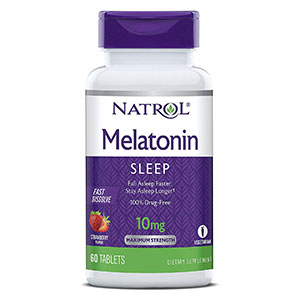
Click here for the lowest price on Amazon
Natrol goes all-in on the melatonin with their Fast Dissolve Tablets. There’s no lab-created additives mucking things up: just melatonin and some flavoring.
What we like: We appreciate that Natrol delivers a significant dose of melatonin. The fact that their capsules are 100% vegan is also a plus. As is the fact that there aren’t a lot of unnecessary ingredients.
Flaws: The artificial strawberry flavor tastes like artificial strawberry flavor. And the sucralose isn’t going to be to everyone’s liking.
2. Simply Sleep Nighttime Sleep Aid
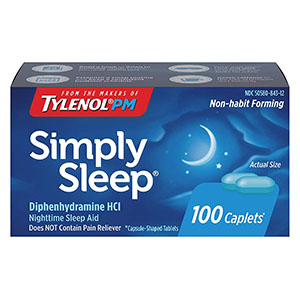
Click here for the lowest price on Amazon
Diphenhydramine is not for everyone, but for many folks it is often quite effective at bringing on a drowsy state that can lead to sleep. Diphenhydramine is the only active ingredient here.
What we like: We like that it’s effective and made by a highly reputable producer. You also get 100 capsules instead of the standard 60. And the affordable price is both surprising and welcome.
Flaws: Like most products from Big Pharma, it contains a laundry list of secondary and inactive ingredients.
3. Luna Gentle Sleep Aid

Click here for the lowest price on Amazon
Luna Gentle Sleep takes the opposite path from Natrol. They embrace a tried and true combination of herbs and amino acids to reduce nervous energy and throw in a smattering of melatonin to create drowsiness.
What we like: The mixture of L-theanine, chamomile, passion flower, lemon, hops, and melatonin has a proven track record. We also like that the capsules are 100% vegan with no GMOs and no food allergens. And that they’re third-party tested for purity
Flaws: We would have liked to see a bit more melatonin. Also, it’s not made in the US if that matters to you.
4. Dreamrite Natural Sleep Aid
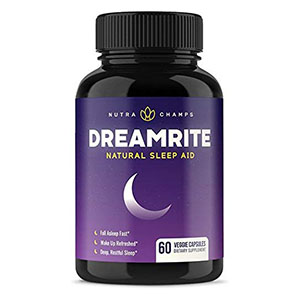
Click here for the lowest price on Amazon
Dreamrite follows Luna down the herbal path, but they go one better by including tryptophan. You know tryptophan. It’s that stuff in turkey that makes you want to sleep after Thanksgiving dinner. There’s also GABA to promote a relaxed mood.
What we like: We like that they didn’t bother to add any artificial flavor. We like that there are no GMOs and that everything is third party tested. The inclusion of tryptophan is also noteworthy, as is the affordable price.
Flaws: If you take more than recommended, expect to feel a bit groggy in the morning.
5. ZzzQuil Nighttime Sleep Aid Liquidcaps
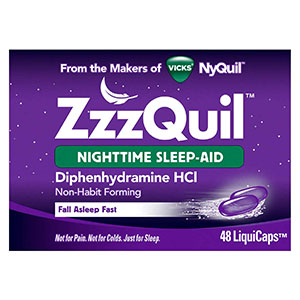
Click here for the lowest price on Amazon
With ZzzQuil Nighttime Liquicaps we return to the land where simplicity rules. This is essentially Nyquil, with the cold and flu ingredients removed. What’s left is diphenhydramine with a bit of sweetener to help the medicine go down.
What we like: We like the simplicity of the product: just diphenhydramine, some color, water, and a bit of sorbitol. We also appreciate that it’s from a company with a solid reputation and that it’s non-habit forming.
Flaws: It seems to do a better job making sure you stay asleep rather than putting you to sleep. Also, diphenhydramine isn’t for everyone.
6. Sleep Sense – Natural Sleep Aid with Melatonin
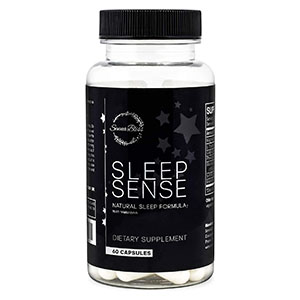
Click here for the lowest price on Amazon
The marketing for this product makes it seem groundbreaking. In reality, it uses a lot of well-known ingredients like tryptophan, GABA, and melatonin. The good news is, while it’s not groundbreaking, it actually does a pretty decent job.
What we like: We like that they provide magnesium to facilitate melatonin. We like that they bolster the melatonin with 5-HTP (tryptophan). And that they include Gaba to calm the nerves.
Flaws: Can produce a bit of a hangover, for lack of a better term. Also, it contains a couple of totally superfluous ingredients.
7. Nuvana Shut Eye Sleep Aid
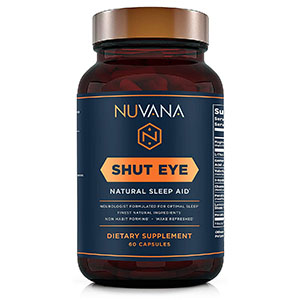
Click here for the lowest price on Amazon
Nuvana Shut Eye touches all the bases with herbs, amino acids, and melatonin. The result is a safe, reliable sleep aid that won’t exactly knock you out, but will help you relax and induce drowsiness. Third-party tested and made in the US.
What we like: Everything is tested by an independent lab. That’s good. There are no common allergens, no genetically modified organisms, and the capsules are certified vegan. Again, all good. The frosting on the cake is 5mg of melatonin per capsule.
Flaws: Contains hypromellose which is normally used in eye drops. And some may object to the smell.
8. Stress-Relax Chewable Tranquil Sleep
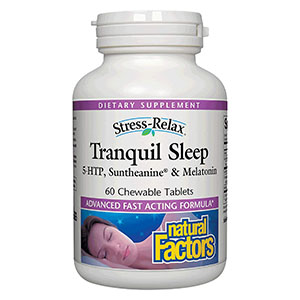
Click here for the lowest price on Amazon
Some folks have difficulty swallowing large pills. For them, there’s Stress Relax Chewables. These contain amino acids, tryptophan and melatonin and are sweetened with cane sugar to make them palatable.
What we like: It’s nice that these are chewable. Sometimes you don’t want to choke down a horse pill. The combination of tryptophan (5-HTP) and melatonin is also quite effective. And there are no GMOs or food allergens.
Flaws: The maker is not a household name. They also contain sugar, so they’re not for people with diabetes.
9. Zhou Driftoff Premium Sleep Aid

Click here for the lowest price on Amazon
Zhou has a reputation for producing high-quality supplements of every imaginable type. So it’s no surprise that their Driftoff earned a spot on our list. With GABA, tryptophan, and more, it sets the stage for a restful night’s sleep.
What we like: We appreciate the well-rounded ingredient list and the inclusion of tryptophan and GABA to aid in relaxation. We also appreciate that it’s made in an FDA certified facility.
Flaws: It’s relatively expensive for this type of product. Also, the melatonin dosage is pretty small (2mg).
10. T6 Star6urn-PM Fat Burner and Sleep Aid
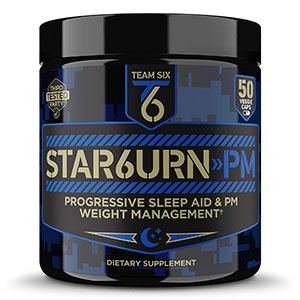
Click here for the lowest price on Amazon
If you’re looking for a sleep aid with some bells and whistles, here it is. It will help you build muscles and burn fat in addition to helping you sleep better. Keep in mind that despite marketing claims, it does contain some caffeine.
What we like: We appreciate the ambition of the manufacturer. We like how effective it is at powering workouts. And that it somehow manages to calm you down afterward. Nice trick that.
Flaws: It does a pretty good job helping you fall asleep. But it contains caffeine that could undermine its effectiveness with some folks. It’s also expensive.
Who Needs A Sleep Aid?
Everybody has trouble getting to sleep now and then. In many cases, this periodic insomnia resolves itself and no help is needed. But there are any number of examples of people who could benefit from using a sleep aid. That includes people who work night shifts and have difficulty sleeping during the day. People who are under a lot of stress at home or at work. Travelers suffering from jet lag lying wide awake in their hotel room. And people whose normal sleep cycle has been interrupted by family emergency or some act of nature, like a hurricane.
Older adults are often drawn to sleep aids. One of the big reasons for this is that natural melatonin production tends to wane as we age. And melatonin is vital to being able to drift off to sleep. At the same time though sleep aids should not be taken every day like vitamins. They’re medication and should be treated as such. And they aren’t guaranteed to solve your insomnia problem either. But chances are they’ll help to at least some degree.
How We Ranked
At the end of the day, a sleep aid is judged on whether it helps you sleep. If you take it and lie awake, then it’s failed, regardless of its ingredient list or how many celebrities endorse it. So, for a sleep aid to make our list, it had to have a demonstrated track record of success.
Beyond that, we looked at ingredients. Most will contain either melatonin or diphenhydramine or maybe both. Melatonin is considered pretty benign. Diphenhydramine, however, has shown a propensity to cause confusion and other side effects in those over 65. Doxylamine succinate is another antihistamine that’s sometimes used in sleep aids. It has a mixed reputation and is not terribly effective.
We also considered who made the product. Because, frankly, when it comes to medications like this, you need to know it’s coming from a reputable source and that production is overseen by the FDA directly or indirectly. So we were definitely biased toward manufacturers with a proven track record of safety and responsibility.
Finally, as you no doubt noticed, we didn’t include any sleep aids that required a prescription. Only OTC products.
FAQs
Q: What is a Sleep Aid?
A: A sleep aid is a type of over the counter (OTC) medication used to combat occasional bouts of insomnia. Sleep aids are commonly used to counteract the effects of jet lag, to help people who work night shifts, to allow people to get to sleep so they can be sharp at work and for many other reasons. OTC sleep aids contain ingredients such as melatonin and diphenhydramine that are known to produce drowsiness. Some contain ingredients gleaned from traditional medicine such as herbs and other plant-based materials. But ingredients aside, the goal is always the same: to help you get to sleep.
Q: Do I need a prescription to buy a sleep aid?
A: You will not need a prescription to buy any of the sleep aids on the above list. That said, if your doctor determines you need something stronger, he or she will need to write you a prescription.
Q: Can I make a sleep aid part of my regular routine?
A: A sleep aid can help you safely combat occasional insomnia. But they are not dietary supplements like multivitamins. And they are not meant to be consumed daily. It’s always preferable if you can find a natural way to alleviate your insomnia rather than reaching for a pill. If your insomnia has reached chronic proportions, you should discuss it with your doctor.
Q: Will a sleep aid help if I drank too much coffee?
A: It might. Then again, it might not. The best way to prevent coffee from keeping you awake at night is to stop drinking it after dinner. It usually takes about 5 hours for caffeine to cycle out of your system. You might be able to speed that up a bit by drinking lots of water and peeing a lot. But really, the best way to prevent caffeine from keeping you awake is to stop drinking it in the evening.
Q: Are sleep aids addictive?
A: In the past, this was a major issue when it came to sleep aids. Some contained the opioid codeine, which was (and is) highly addictive (1). Codeine was also widely used in cough syrups at the time. And people with insomnia would sometimes drink these cough syrups to help them get to sleep. Fortunately, the FDA banned the use of codeine in OTC cough syrups and sleep aids in the 1970s.
Q: Is melatonin a good sleep aid?
A: Melatonin (2) is one of the most common ingredients in over the counter sleep aids. It’s a hormone produced by the brain that helps regulate a person’s internal clock. It is believed to signal the brain that it’s time to sleep. One reason older people often have trouble getting to sleep is because melatonin production tends to decrease with age (3). So yes, melatonin is considered helpful in getting to sleep.
Q: Why does my sleep aid have antihistamines?
A: A lot of people associate antihistamines with allergy medications. And, since they don’t have allergies, they’re both confused and concerned because a sleep aid contains antihistamines. But while antihistamines (4) are fairly effective at treating allergies they are also able to induce drowsiness. Hence their inclusion in some sleep aids.
Q: Can I overdose on melatonin?
A: There is little evidence to support the idea that a person can overdose on melatonin (5). At the same time, however, clinical research into the topic is relatively sparse. What we have is a mountain of anecdotal evidence that suggests there is not much to worry about. Still, the lack of clinical research into the long term effects of taking supplemental melatonin suggests a cautious approach is best.
Q: Will a sleep aid work if my room is hot?
A: This is a good question because hot temperatures are known to disrupt people’s ability to drift off to sleep (6). At the same time, however, not everyone can afford to run the air conditioner all night. While a sleep aid won’t cool down your room, it may help you get to sleep faster. You can aid its effectiveness by doing things like taking a shower before you go to bed and using a fan.
Q: Can a sleep aid help with jet lag?
A: Jet lag (7) is a common side effect of modern travel. In just a few hours, a person is catapulted from their home base to an entirely different part of planet earth, where the sun rises and sets on a different schedule. Business travelers, tourists and more are all susceptible to jet lag. Melatonin, a common ingredient in many sleep aids, has been shown to be effective in combating jet lag (8).
Q: Will a sleep aid stop me from waking up in the middle of the night?
A: Most of the better sleep aids will help people both get to sleep and stay asleep. However, some are better at preventing people from waking up in the middle of the night than others. And some are better at helping people drift off to sleep. If you have any questions regarding a specific sleep aid, read what actual users are saying about it, or ask your doctor.
Q: Can a sleep aid make me sleep too much?
A: Exactly what constitutes ‘too much sleep’ is open to debate. It is believed the average adult needs an average of about 8 hours of sleep per night (9). But some individuals live to ripe old ages and never get more than 6 hours or so per night. Sometimes less. So while evidence suggests there are some real risks to sleeping too much (10), you’re the only one who can really say what is enough for you and what is too much.
Q: Are there alternatives to sleep aids?
A: Alternatives to sleep aids typically involve diet and lifestyle changes. Drinking less coffee, not taking work home with you, not letting relationship conflicts linger, and more can help prevent episodes of insomnia. Blue light from a smartphone screen can also bring on insomnia (11). So people are often encouraged to put their phone away when they go to bed.
Q: What is diphenhydramine?
A: Diphenhydramine is an antihistamine commonly used to combat allergy symptoms. It is sometimes found in sleep aids. That’s because it is known to produce drowsiness as a side effect. While it’s considered a more hit-or-miss ingredient than melatonin, there are plenty of people who swear by its effectiveness.
Q: Will a sleep aid produce side effects?
A: Diphenhydramine has been known to cause confusion in some people. Mostly older individuals. And for that reason, those over 65 are typically discouraged from taking sleep aids that contain diphenhydramine. For the most part, however, OTC sleep aids are considered pretty safe. Some people say they experience a kind of hangover effect (mild headache, grogginess). But this is pretty rare.
Q: Should I ask my doctor about using a sleep aid?
A: If you’re having trouble getting to sleep, it’s always best to discuss the matter with your doctor before resorting to medication. Regardless of how harmless that medication may be. That’s because you could potentially develop a psychological dependence (12) on a medication. Even if it doesn’t contain any overtly addictive substances like codeine.
Q: What are the risks of taking a sleep aid?
A: As we just mentioned psychological dependence is always a possibility. Which is why sleep aids should be used sparingly. Beyond that, you should avoid taking more than the recommended amount so that it doesn’t interfere with your waking activities. And people over 65 should use them with caution to prevent the possibility of nighttime falls.
Q: Why do we need sleep?
A: The short answer is: we don’t know. The long answer is: multiple theories have been floated, but none has gathered universal acceptance. One theory suggests sleep may have to do with providing time to recover from damage done to the body and mind during the day. Another theory suggests it evolved out of a need our ancestors had to conserve energy. And still another theory suggests sleep provides our brain time to process and organize experiences, thoughts and feelings. That way, we can face the new day with our priorities in order. Exactly which theory is right? No one really knows.
Related Articles
Recap
Modern sleep aids are easy to get, affordable, effective, and non-addictive. They utilize ingredients like melatonin that are well-known to produce drowsiness with few if any adverse side effects.
As we have seen, being able to get a good night’s sleep can pay enormous short and long term health dividends. While merely putting up with insomnia is bound to cause a cascade of problems that could haunt a person their entire life.
All of the sleep aids on our list have proven themselves safe and effective. If you are having trouble with occasional insomnia, you should consider using one to help. You’ll likely be happy you did.
For cpoe.org’s #1 recommended sleep aid, click here.

